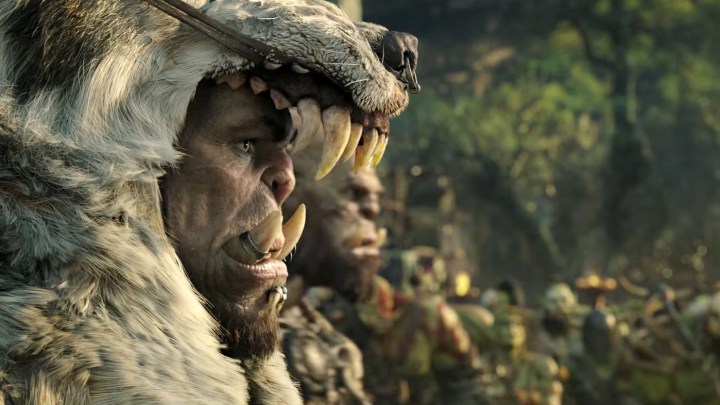
We need to finally put our collective foot down. After Warcraft, enough is enough! Producers, directors, actors, key grips, production assistants, and anyone else responsible for bringing video games to the big screen: For the love of God, please stop.
It all started with Mario
The earliest case of a major game franchise making the jump to film, 1993’s Super Mario Bros., is still used as a cautionary tale for how not to move to the big screen. Its setting bears little resemblance to anything we’ve seen in the Mario games, its dark, edgy ‘90s tone is completely at odds with the whimsy of the Mushroom Kingdom, and its ludicrously dumb characters are now the stuff of legend. Aside from Bob Hoskins as Mario and John Leguizamo as Luigi, Dennis Hopper’s performance as King Koopa is so far removed from any other version of Bowser we’ve seen, many folks probably don’t realize it’s the same character at all.
If it just came down to the writing, this year’s Doom game reboot would have been eviscerated.
“It always just comes down to writing and material,” star Dwayne Johnson told MTV back in 2009.
We love you, Rock, but if it just came down to the writing, this year’s Doom game reboot would have been eviscerated. Instead, it’s among the best shooters of the year and certainly surpassed most fans’ expectations. The writing wasn’t the problem with Doom the movie. The tone wasn’t the problem, either. Hell, the first-person scene at the film’s conclusion wasn’t even the problem. Watching actors killing demons on the big screen instead of getting to do it yourself is simply less enjoyable, and we’re better able to accept the cheese when it’s in “our” world — a world where we become the Doom guy and embrace the ludicrous nature of everything happening around us.
Outside Super Mario Bros. and Doom, there are countless examples of failed video game movies in the last couple decades, including Lara Croft: Tomb Raider, Street Fighter, Prince of Persia, BloodRayne, Silent Hill, Final Fantasy: The Spirits Within, Max Payne, DOA: Dead or Alive, Hitman, Mortal Kombat, Need for Speed, Postal, Double Dragon, and Resident Evil. Even if you have a personal love of any of these movies, none of them transcended B movie status.
Nothing has changed
The worst part is, while Doom should have been a warning to future filmmakers a decade ago, we’re still seeing video game movies make the exact same mistakes in 2016. Ratchet & Clank attempted to turn a 10-hour video game into a 90-minute film. The same creative team is trying to adapt Sly Cooper in a similar manner. And The Last of Us, which has literally been called “The Citizen Kane of video games,” and has been hailed for its storytelling, may actually get turned into a motion picture, though it now seems like the project is having trouble getting off the ground.
Perhaps it’s best that Sony lets it die.
“Just another video game movie” also sums up the reaction to Warcraft, perhaps the biggest game-to-film letdown thus far. What’s most disappointing isn’t that the Warcraft license was used to create something so anemic, however. It’s that the talent behind the film seemed to have everything going for it. A huge budget, publisher Blizzard’s involvement, stars like Dominic Cooper and Ben Foster, and most important, the talented Duncan Jones behind the camera. Jones’ 2009 film Moon, while remarkably different from anything Blizzard has ever made, took a science-fiction concept bordering on fantasy and managed to keep it not only grounded, but also coherent. His next film, Source Code, was also a fun time-traveling sci-fi adventure.
With all that going for it, Warcraft failed. Why? Because it’s no Moon. Moon was written as a movie and designed as a narrative. Its character arcs, twists, and its scale were made to fit into a clean two-hour period. Expecting anyone, even a director as skilled as Jones, do the same thing with video game lore and canon spanning two decades is unfathomable.
Oddly, the best video game movie to come out in the last few years was Wreck-It Ralph, and that’s probably because it was developed as a story, and wasn’t based on an actual video game (though the main character has strong ties to Donkey Kong).
More disappointments to come
Sadly, we may see the same events play out in the Assassin’s Creed film later this year. It has the same star power behind it with big-name actors Michael Fassbender and Marion Cotillard, and director Justin Kurzel’s last project, Macbeth, was met with critical acclaim. But the best moments in Assassin’s Creed are player-driven, and early teasers show a film that is attempting to hit “all the important stuff” from the series: Watching someone jump into a pile of hay isn’t the same as getting to do it yourself, and when “it’s just like the game” is the best compliment a film can receive, it calls into question why it needs to exist at all … aside from “so it can make money,” of course.
The repeated failure of video game adaptations shouldn’t make us believe that our favorite medium is somehow inferior. It’s different. That’s a good thing! Video games are capable of telling the types of stories we have only seen glimpses of in the recent “golden age of television,” and even those lack the agency and choice that define the industry.
Instead of sulking that we’ll never see The Last of Us in theaters, why don’t we celebrate the narrative successes of the video game? Video games don’t need to prove themselves anymore, and a transition to film is certainly not necessary. They are more than capable of telling great stories on their own. Please, let’s get Hollywood out of our games and just let them be.


